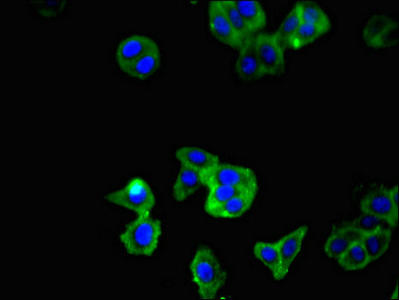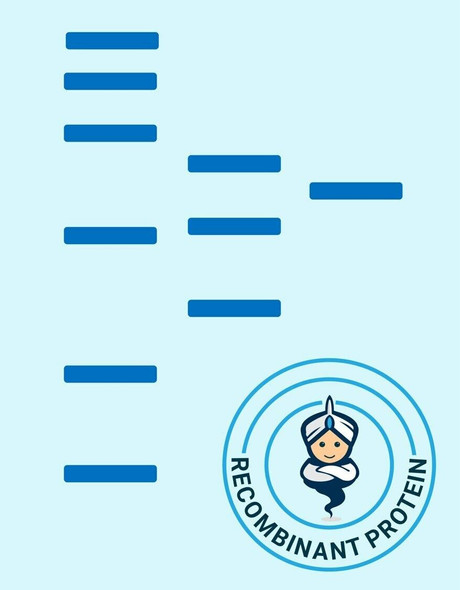| UniProt Protein Function: | TNFSF11: Cytokine that binds to TNFRSF11B/OPG and to TNFRSF11A/RANK. Osteoclast differentiation and activation factor. Augments the ability of dendritic cells to stimulate naive T-cell proliferation. May be an important regulator of interactions between T-cells and dendritic cells and may play a role in the regulation of the T-cell-dependent immune response. May also play an important role in enhanced bone-resorption in humoral hypercalcemia of malignancy. Homotrimer. Up-regulated by T-cell receptor stimulation. Highest in the peripheral lymph nodes, weak in spleen, peripheral blood Leukocytes, bone marrow, heart, placenta, skeletal muscle, stomach and thyroid. Belongs to the tumor necrosis factor family. 3 isoforms of the human protein are produced by alternative splicing. |
| UniProt Protein Details: | Protein type:Membrane protein, integral Cellular Component: extracellular space; membrane; cytoplasm; integral to membrane; plasma membrane; extracellular region; intracellular Molecular Function:protein binding; cytokine activity; tumor necrosis factor receptor superfamily binding; tumor necrosis factor receptor binding Biological Process: positive regulation of osteoclast differentiation; multicellular organismal development; positive regulation of JNK cascade; osteoclast differentiation; activation of JNK activity; positive regulation of homotypic cell-cell adhesion; positive regulation of corticotropin-releasing hormone secretion; activation of NF-kappaB transcription factor; calcium ion homeostasis; positive regulation of MAP kinase activity; monocyte chemotaxis; regulation of osteoclast differentiation; tumor necrosis factor-mediated signaling pathway; positive regulation of bone resorption; cell differentiation; protein homooligomerization; bone resorption; ossification; positive regulation of I-kappaB kinase/NF-kappaB cascade; cytokine and chemokine mediated signaling pathway; mammary gland epithelial cell proliferation; lymph node development; positive regulation of protein kinase B signaling cascade; organ morphogenesis; immune response; positive regulation of transcription from RNA polymerase II promoter; positive regulation of transcription factor activity; positive regulation of T cell activation; positive regulation of phosphorylation |
| UniProt Code: | O35235 |
| NCBI GenInfo Identifier: | 342187063 |
| NCBI Gene ID: | 21943 |
| NCBI Accession: | O35235.2 |
| UniProt Secondary Accession: | O35235,O35306, Q3TWY5, Q9JJK8, Q9JJK9, Q9R1Y0, |
| UniProt Related Accession: | O35235 |
| Molecular Weight: | 22,150 Da |
| NCBI Full Name: | Tumor necrosis factor ligand superfamily member 11 |
| NCBI Synonym Full Names: | tumor necrosis factor (ligand) superfamily, member 11 |
| NCBI Official Symbol: | Tnfsf11 |
| NCBI Official Synonym Symbols: | ODF; OPG; OPGL; RANKL; Ly109l; Trance |
| NCBI Protein Information: | tumor necrosis factor ligand superfamily member 11; OPG ligand; osteoprotegerin ligand; osteoclast differentiation factor; receptor activator of NF-kappaB ligand; TNF-related activation-induced cytokine; receptor activator of nuclear factor kappa B ligand; receptor activator of nuclear factor kappa-B ligand; tumor necrosis factor-related activation-induced cytokine |
| UniProt Protein Name: | Tumor necrosis factor ligand superfamily member 11 |
| UniProt Synonym Protein Names: | Osteoclast differentiation factor; ODF; Osteoprotegerin ligand; OPGL; Receptor activator of nuclear factor kappa-B ligand; RANKL; TNF-related activation-induced cytokine; TRANCE; CD_antigen: CD254Cleaved into the following 2 chains:Tumor necrosis factor ligand superfamily member 11, membrane form; Tumor necrosis factor ligand superfamily member 11, soluble form |
| UniProt Gene Name: | Tnfsf11 |
| UniProt Entry Name: | TNF11_MOUSE |






